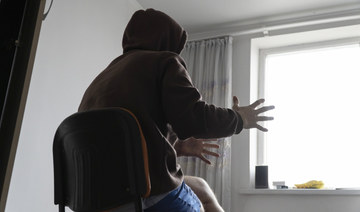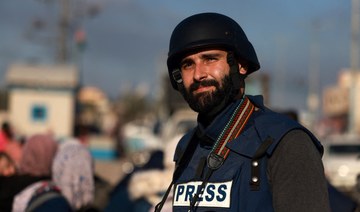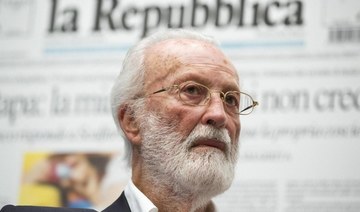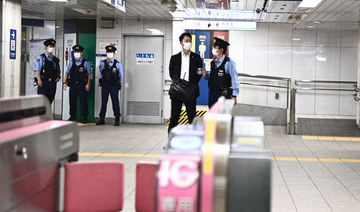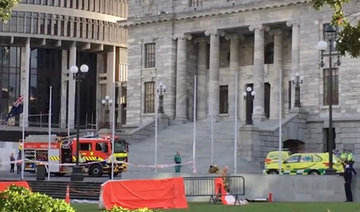PARIS: France's data regulator said Wednesday that it had fined Apple eight million euros ($8.5 million) for breaching privacy laws on its App Store.
The CNIL said the US tech giant had installed trackers on the devices of French users without directly asking their consent, allowing it to place targeted ads within the App Store.
Apple said in a statement that it was "disappointed" with the decision and would appeal.
"Apple Search Ads goes further than any other digital advertising platform we are aware of by providing users with a clear choice as to whether or not they would like personalized ads," it said.
Apple has touted itself as a champion of privacy and in 2021 allowed users to easily block apps from collecting personal data.
The move helped put a severe dent in the business models of its rivals, particularly Facebook owner Meta, which relies on collecting personal data to power its advertising algorithms.
Apple's competitors have long accused it of hypocrisy, claiming it wants to keep and exploit the data for itself.
The CNIL is one of Europe's most active regulators and has repeatedly fined US tech giants for breaches of data privacy.
The complaint against Apple was filed in March 2021 by a group of French app developers, and a CNIL investigation found that users were opting in to the data collection by default.
Similar cases have also been opened in Germany and Poland.
However, the French fine was relatively low as CNIL accepted that Apple had quickly changed its system when told of the breaches.
As the issue fell under domestic French law rather than European law, the punishment was limited to the damage inflicted in France.
The fine was the latest against US tech giants by European regulators increasingly vigilant on privacy, requiring tough protections on personal data that the companies often roll out well beyond the Continent.
Also Wednesday, social media giant Meta was slapped with fines totalling 390 million euros ($413 million) by Irish regulators for breaching EU personal data laws on Facebook and Instagram.
France regulator raps Apple over App Store ads
https://arab.news/9ejb9
France regulator raps Apple over App Store ads

- Tech giant is accused of installing trackers on the devices without directly asking user consent
- Fine was relatively low as CNIL accepted that Apple had quickly changed its system when told of the breaches
Russia orders jail term for Meta spokesman in absentia on ‘terrorism’ charges
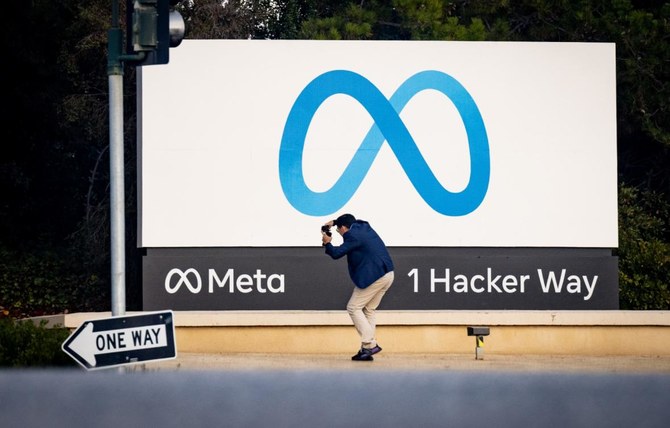
- Andy Stone was sentenced to six years in what has been described as a symbolic ruling agaist Western social media platforms
MOSCOW: A Russian military court on Monday sentenced in absentia Meta spokesman Andy Stone to six years behind bars for “justifying terrorism,” as part of efforts to restrict Western social media platforms in the country.
The largely symbolic ruling came several months after Mosocw, which has blocked Meta platforms Instagram and Facebook, put the US citizen on a wanted list.
Judge Roman Kiforenko said the sentence would begin upon Stone setting foot on Russian territory or being extradited to Russia, news agencies reported.
The case followed a post by Stone in March 2022 — weeks into Moscow’s offensive in Ukraine — in which he said Facebook would not punish users calling for violence against Russian forces.
Stone said Meta had “temporarily made allowances for forms of political expression that would normally violate our rules like violent speech such as ‘death to the Russian invaders.’“
“We still won’t allow credible calls for violence against Russian civilians,” the post read.
Nick Clegg, the President of Meta Global Affairs, said at the time that the policy would only apply “in Ukraine itself.”
Clegg said the decision was taken in “extraordinary and unprecedented circumstances” and was designed to protect “people’s rights to speech as an expression of self-defense.”
Russia barred Meta CEO Mark Zuckerberg from entering the country shortly after launching hostilities in Ukraine.
Moscow does not tolerate criticism of the offensive on social media, imposing fines or jail terms to thousands for denouncing the large-scale military campaign now in its third year.
Terry Anderson, US journalist held hostage nearly 7 years in Lebanon, dead at 76

- Former AP correspondent was abuducted by pro-Iran Shiite Muslim group as part of “continuing operations against Americans”
LONDON: Terry Anderson, a US journalist who was held captive by Islamist militants for almost seven years in Lebanon and came to symbolize the plight of Western hostages during the country’s 1975-1990 civil war, died on Sunday at age 76, his daughter said in a statement.
The former chief Middle East correspondent for The Associated Press, who was the longest held hostage of the scores of Westerners abducted in Lebanon, died at his home in Greenwood Lake, New York, said his daughter Sulome Anderson, who was born three months after he was seized. No cause of death was given.
Kept in barely-lit cells by mostly Shiite Muslim groups in what was known as The Hostage Crisis, and chained by his hands and feet and blindfolded much of the time, the former Marine later recalled that he “almost went insane” and that only his Roman Catholic faith prevented him from taking his life before he was freed in December 1991.
“Though my father’s life was marked by extreme suffering during his time as a hostage in captivity, he found a quiet, comfortable peace in recent years. I know he would choose to be remembered not by his very worst experience, but through his humanitarian work with the Vietnam Children’s Fund, the Committee to Protect Journalists, homeless veterans and many other incredible causes,” Sulome Anderson said.
The family will take some time to organize a memorial, she said.
Anderson’s ordeal began in Beirut on the morning of March 16, 1985, after he played a round of tennis. A green Mercedes sedan with curtains over the rear window pulled up, three gunmen jumped out and dragged Anderson, still dressed in shorts, into the car.
The pro-Iran Islamic Jihad group claimed responsibility for the kidnapping, saying it was part of “continuing operations against Americans.” The abductors demanded freedom for Shiite Muslims jailed in Kuwait for bomb attacks against the US and French embassies there.
It was the start of a nightmare for Anderson that would last six years and nine months during which he was stuck in cells under the rubble-strewn streets of Beirut and elsewhere, often badly fed and sleeping on a thin, dirty mattress on a concrete floor.
During captivity, both his father and brother would die of cancer and he would not see his daughter Sulome until she was six years old.
“What kept me going?” he asked aloud shortly after release. “My companions. I was lucky to have people with me most of the time. My faith, stubbornness. You do what you have to. You wake up every day, summon up the energy from somewhere. You think you haven’t got it and you get through the day and you do it. Day after day after day.”
Other hostages described Anderson as tough and active in captivity, learning French and Arabic and exercising regularly.
However, they also told of him banging his head against a wall until he bled in frustration at beatings, isolation, false hopes and the feeling of being neglected by the outside world.
“There is a limit of how long we can last and some of us are approaching the limit very badly,” Anderson said in a videotape released by his captors in December 1987.
Marcel Fontaine, a French diplomat who was released in May 1988 after three years of captivity, recalled the time cell mate Anderson thought freedom was near because he was allowed to see the sun and eat a hamburger.
In April 1987 Anderson was given a suit of clothes that his captors had made for him. “He wore it every day,” Fontaine said.
A week later, however, Anderson’s captors took the suit back, leaving him in despair and certain he was forgotten, Fontaine said.
Scores of journalist groups, governments and individuals over the years called for Anderson’s release and his Oct. 27 birthday became an unofficial US memorial day for hostages.
Anderson said he considered killing himself several times but rejected it. He relied heavily on his faith, which he said he had renewed six months before being kidnapped.
“I must have read the Bible 50 times from start to finish,” he said. “It was an enormous help to me.”
His sister, Peggy Say, who died in 2015, was his fiercest advocate during captivity.
She worked tirelessly for her brother’s freedom. She visited Arab and European capitals, lobbied the Pope, the Archbishop of Canterbury and every US official and politician available.
Under pressure from the media and the US hostages’ families, the Reagan administration negotiated a secret and illegal deal in the mid-1980s to facilitate arms sales to Iran in return for the release of American hostages. But the deal, known as the Iran–Contra affair, failed to gain freedom for any of the hostages.
Born Oct. 27, 1947, in Lorain, Ohio, Anderson grew up in Batavia, New York. He graduated from Iowa State University and spent six years in the Marine Corps, mostly as a journalist.
He worked for the AP in Detroit, Louisville, New York, Tokyo, Johannesburg and then Beirut, where he first went to cover the Israeli invasion in 1982.
In that war-torn city, he fell in love with Lebanese woman Madeleine Bassil, who was his fiance and pregnant with their daughter Sulome when he was snatched.
He is survived by his daughters Sulome and Gabrielle, his sister Judy and brother Jack, and by Bassil, whom Sulome Anderson called “his ex-wife and best friend.”
Anderson and fellow hostages developed a system of communication by tapping on walls between their cells. Always the journalist, Anderson passed on news of the outside world he had picked up during captivity to Church of England envoy Terry Waite, being held hostage in an adjacent room in September 1990 after years of solitary confinement.
“Then the world news: the Berlin Wall’s falling, communism’s demise in eastern Europe, free elections in the Soviet Union, work toward multiracial government in South Africa. All the incredible things that have happened since he was taken nearly three years ago. He thought I was crazy,” Anderson wrote in his 1993 book “Den of Lions.”
After his release, Anderson taught journalism at Columbia University in New York, Ohio University, the University of Kentucky and the University of Florida until he retired in 2015.
Among businesses he invested in were a horse ranch in Ohio, and a restaurant. He unsuccessfully ran for the Ohio state Senate as a Democrat in 2004 and sued Iran in federal court for his abduction, winning a multimillion-dollar settlement in 2002.
British man investigated for hate crime after viral racist rant against Muslim women

- ‘I don’t understand why people stand by and let it happen,’ says witness
LONDON: A hate crime investigation is underway following a viral video of an attack against Muslim women in East London, police confirmed on Sunday.
The incident occurred on Saturday in Romford when a white male, wearing glasses, targeted the group, some of whom were wearing hijabs and pushing shopping trolleys.
The footage, shared by Redbridge Community Action Group, shows the man following the women down South Street, a busy shopping area, while shouting and gesturing aggressively as they attempt to leave the scene.
The man is heard using profanities and labeling the women “Muslim traitors.”
In an outburst caught on camera, he accused one of the women of supporting missile attacks against Israel, adding: “We don’t want you here.” He went on to use an expletive.
The Metropolitan Police has confirmed it is treating the confrontation as a hate crime.
Scotland Yard posted on X: “We are aware and urgently investigating this clearly unacceptable incident. We will be speaking to the victim later.”
Vaseem Ahmed, 55, who was participating in a rally supporting a free Palestine, and located near Barclays Bank on the high street, witnessed the incident.
As police arrived, Ahmed noted that the activists dispersed, with the confrontation occurring as the women headed home.
He told The Independent: “I’d say to him (the white male) ‘If you’re going to be brave, do the same thing in front of some Muslim men (and) then see what the outcome is.’
“Don’t target innocent people; it’s the worst kind of bullying. And grow up. Some of the stuff he was saying was really vile.
“He was so angry and so worked up he couldn’t get his words out properly. It wasn’t the most eloquent rant.”
He added: “I know those women from other demonstrations. I was shocked in the way it happened, but then not shocked at the same time. Islamophobic attacks have skyrocketed since Oct. 7.
“A lot of government ministers and even Rishi Sunak refuse to call out Islamophobia when it happens, and people get emboldened.
“We are visibly Muslim, especially women, (and) they become easy targets. That’s the saddest thing.
“I didn’t see anyone intervene. They might have been concerned for their safety, but all you have to do is shout a few times; you don’t have to put yourself in danger. I don’t understand why people stand by and let it happen.”
Arab News scoops 4 Merit Winner nods in 59th Society of Publication Designers competition

- Awards across print, digital, infographics and illustrations ‘testament to talent and dedication of design and editorial teams’
LONDON: Arab News, the leading English-language daily newspaper in the Middle East, has won four Merit Winner awards at this year’s Society of Publication Designers competition.
Arab News’ “The Kingdom vs. Captagon” Spotlight piece garnered recognition in the two categories — Custom Feature and Single Page.
The two remaining accolades went to the “Onions’ tears and inflation fears” in the Feature Opener category and the “Guide to Hajj” in Infographic, commended for its exceptional data visualization.
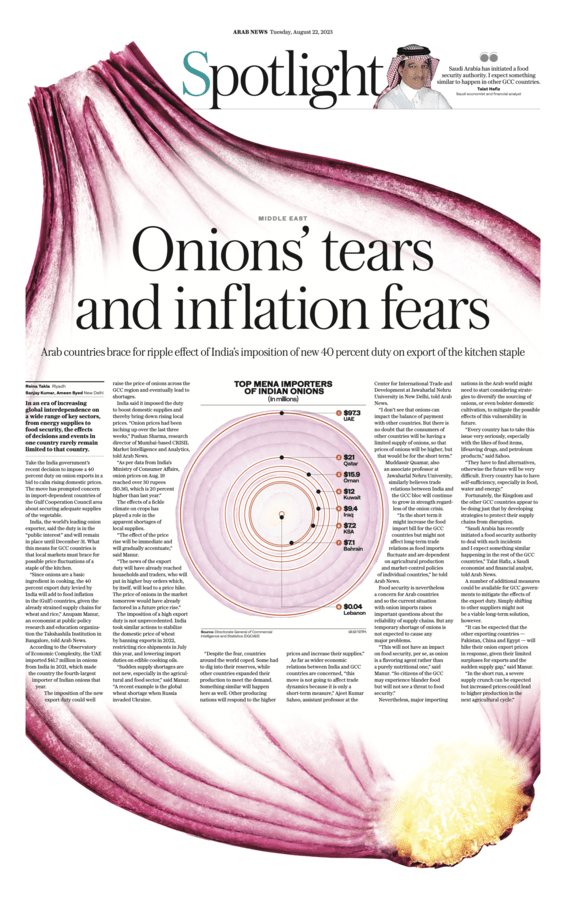
“We are extremely proud to have won four awards at this year’s prestigious SPD competition,” Omar Nashashibi, head of design at Arab News, said.
“To win awards across print, digital, infographics and illustrations is testament to the talent and dedication of the Arab News design and editorial teams in creating engaging content for our readers.”
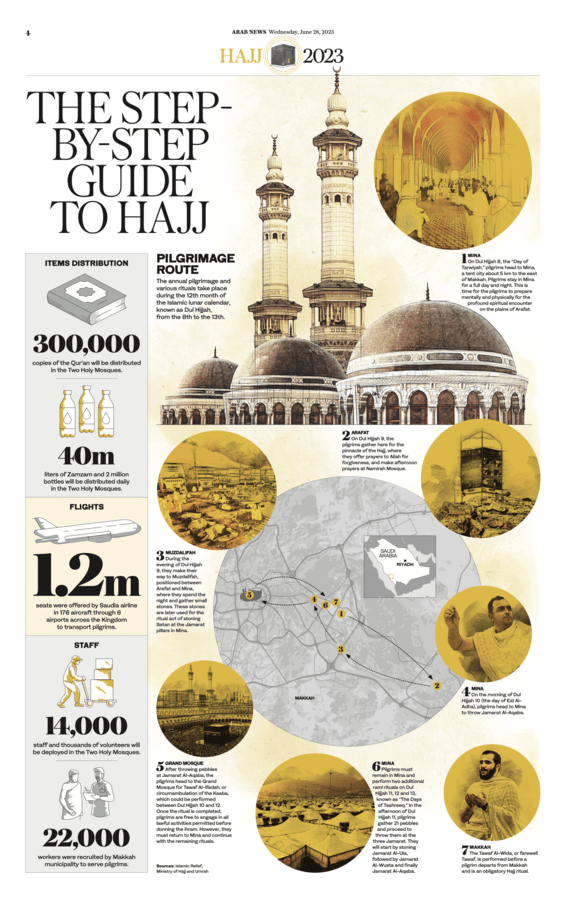
Since 1965, the annual SPD awards have promoted and celebrated excellence in editorial design, photography and illustration across both print and digital mediums. This year, the competition’s jury received thousands of entries from around the globe.
Man who set himself on fire outside Trump trial dies of injuries, police say
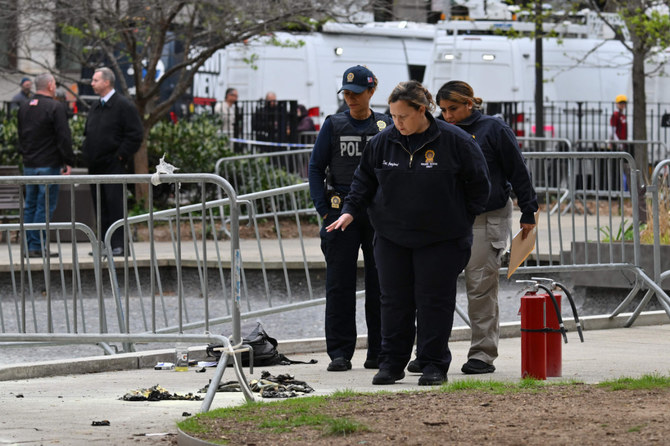
- Some officers and bystanders rushed to the aid of the man
- The man, who police said recently traveled from Florida to New York, had not breached any security checkpoints to access the park
NEW YORK: A man who doused himself in an accelerant and set himself on fire outside the courthouse where former President Donald Trump is on trial has died, police said.
The New York City Police Department told The Associated Press early Saturday that the man was declared dead by staff at an area hospital.
The man was in Collect Pond Park around 1:30 p.m. Friday when he took out pamphlets espousing conspiracy theories, tossed them around, then doused himself in an accelerant and set himself on fire, officials and witnesses said.
A large number of police officers were nearby when it happened. Some officers and bystanders rushed to the aid of the man, who was hospitalized in critical condition at the time.
The man, who police said recently traveled from Florida to New York, had not breached any security checkpoints to access the park.
The park outside the courthouse has been a gathering spot for protesters, journalists and gawkers throughout Trump’s trial, which began with jury selection Monday.
Through Friday, the streets and sidewalks in the area around the courthouse were generally wide open and crowds have been small and largely orderly.
Authorities said they were also reviewing the security protocols, including whether to restrict access to the park. The side street where Trump enters and leaves the building is off limits.
“We may have to shut this area down,” New York City Police Department Deputy Commissioner Kaz Daughtry said at a news conference outside the courthouse Friday, adding that officials would discuss the security plan soon.






